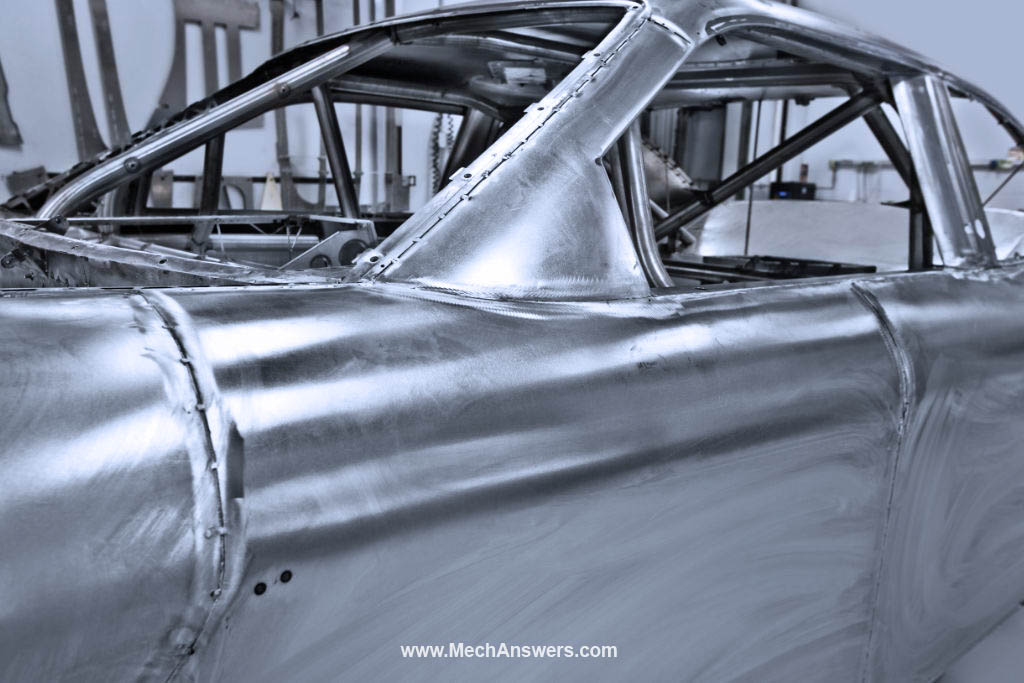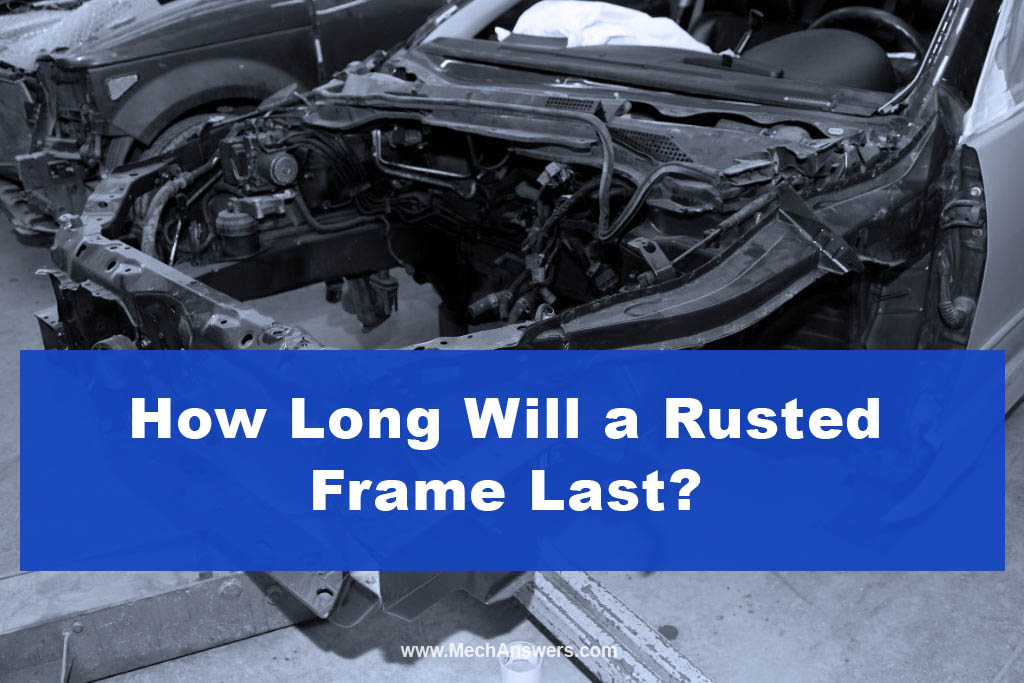Have you ever found yourself pondering or even googling the question, “How Long Will a Rusted Frame Last?” If so, your search ends here. This article is designed to guide you through all you need to know about the lifespan of a rusted vehicle frame.
So, how long will a rusted frame last? Well, the lifespan of a rusted frame depends largely on the extent of the rust, the type of rust, and how swiftly and effectively it is treated. However, if the rust has progressed to the scale or penetrating stage and has begun compromising the structural integrity of the vehicle, the frame could fail in as little as a few months to a couple of years.
The information within could potentially save you time, and money, and ensure your safety on the road.
Table of Contents
Factors Affecting the Lifespan of a Rusted Frame
Extent of rust
Surface rust:
This is the initial stage of rusting, characterized by a reddish-brown discoloration on the metal surface. Surface rust is relatively easy to treat and remove, and its impact on the frame’s lifespan is minimal if addressed promptly.
Scale rust:
As rust progresses, it starts to form flakes or scales, causing the metal to weaken. Scale rust is more challenging to remove and poses a more significant threat to the frame’s structural integrity and lifespan.
Penetrating rust:
This advanced stage of rusting results in deep pits and holes in the metal, severely compromising the frame’s strength. Penetrating rust is difficult to reverse and often requires extensive repairs or replacement of the affected parts to maintain the frame’s functionality.
Type of metal
Steel:
Steel is highly susceptible to rust due to its iron content. The presence of moisture and oxygen leads to corrosion, reducing the steel frame’s lifespan if not properly treated or maintained.
Aluminum:
While aluminum does not rust, it can corrode. Aluminum oxide forms a protective layer that prevents further corrosion, making aluminum frames more resistant to damage and longer lasting than steel ones.
Stainless steel:
This metal contains chromium, which forms a protective layer against rust. Stainless steel frames are more resistant to rust than regular steel, but they can still corrode under specific conditions, affecting their longevity.
Environmental factors
Humidity:
High humidity levels accelerate the rusting process by providing moisture, which reacts with the metal to form rust. Frames exposed to high-humidity environments will have shorter lifespans if not adequately protected or maintained.
Saltwater exposure:
Saltwater significantly speeds up the corrosion process due to the presence of chloride ions. Metal frames in coastal areas or exposed to saltwater are at a higher risk of rusting and require extra attention to prolong their lifespan.
Temperature fluctuations:
Frequent changes in temperature can cause condensation on metal surfaces, promoting rust formation. Frames exposed to such conditions may experience a reduced lifespan unless preventive measures are taken.
Usage and maintenance
Regular inspections:
Frequent checks for signs of rust and corrosion can help detect issues early, enabling prompt treatment and extending the frame’s life.
Proper cleaning and storage:
Keeping the frame clean and dry, especially after exposure to moisture or corrosive substances, can slow down rust formation. Storing the frame in a dry, well-ventilated area also helps prolong its lifespan.
Repair of damage:
Addressing any rust-related damage promptly and effectively ensures the frame’s integrity and extends its usability. This may include removing rust, applying protective coatings, or replacing severely compromised parts.

How Long Will a Rusted Frame Last?
Understanding Rust on a Frame
The question, “How long will a rusted frame last?” comes with various factors to consider. Primarily, the longevity of a rusted frame hinges on the degree of rust development and where it’s located.
Rust is a form of iron oxide, which forms when iron (or its alloys) reacts with water and oxygen. This reaction is often inevitable in vehicles, given their exposure to the elements.
Three Levels of Rusting
Rusting typically progresses in three levels: surface rust, scale rust, and penetrating rust. Each of these levels signifies a deeper progression into the iron material, thereby affecting the strength and durability of the affected parts.
Surface Rust and Frame Longevity
Surface rust is the initial phase of rusting and usually affects only the top layer of your car’s metal. This level of rust generally does not impact the structural integrity of the frame and can be dealt with relatively easily.
For a frame with surface rust, the lifespan is likely not significantly affected provided the rust is properly treated to prevent further corrosion.
Scale Rust and Frame Longevity
When rust advances beyond the surface and starts to pit the metal, scale rust forms. This rust is characterized by flaking areas on the frame, which can appear thinner or weaker. The structural integrity of the frame begins to be compromised at this stage, potentially reducing its lifespan.
A frame suffering from scale rust can last considerably less than a frame with just surface rust unless appropriately treated.
Penetrating Rust and Frame Longevity
Penetrating rust, the most serious level, occurs when corrosion eats entirely through the metal. This type of rust compromises the vehicle’s structural integrity and is a clear indication that the frame’s lifespan is in jeopardy.
A frame with penetrating rust may fail in a matter of months or a couple of years, depending on the severity and the load the frame endures.
Environmental Impact on Frame Rusting
The environment where the vehicle is driven also impacts the speed at which rust forms and progresses, thereby affecting the frame’s lifespan. Vehicles in coastal areas or regions where salt is used on roads during winter are likely to rust quicker.
The lifespan of a rusted frame in harsh climates will generally be shorter than that of a similar frame in drier, less corrosive environments.
Impact of Regular Inspection and Maintenance
Regular inspections can help identify and address rust development early, which in turn can extend the life of a rusted frame.
Removing surface rust before it evolves into scale or penetrating rust is a crucial preventative measure. With proper and timely maintenance, a rusted frame can continue to serve for many more years.
Structural Load and Frame Lifespan
The load and stress a frame is subjected to can also influence how long a rusted frame will last. Heavy loads or rough handling can speed up the deterioration of a rusted frame. In strenuous conditions, even a frame with moderate rusting may have a significantly shortened lifespan.
Professional Assessment of Frame Rusting
The best way to determine how long a rusted frame will last is through a professional assessment. A skilled professional can gauge the extent and depth of the rust, consider the environmental and load factors, and provide a reasonably accurate estimate of the frame’s remaining lifespan.
This professional insight can help you make informed decisions regarding your vehicle’s safety and viability.
Preventing Frame Rust
Preventing rust or at least slowing its progression can significantly prolong a frame’s lifespan. Regular washing, especially during winter months, can help remove corrosive salt.
The application of anti-rust sprays and regular paint touch-ups can further protect the frame. Being proactive about rust prevention can add years to your vehicle frame’s life.
Making the Decision to Repair or Replace
Ultimately, determining how long a rusted frame will last helps you decide whether to repair or replace the frame, or possibly the entire vehicle.
Safety is paramount, so a frame with extensive penetrating rust should likely be replaced. The decision to repair or replace a rusted frame is an important one, affecting both safety and financial aspects.
Each of these points plays a role in answering the question, “How long will a rusted frame last?” The answer is not straightforward, but with understanding and vigilance, it’s possible to maximize the lifespan of a rusted frame and ensure the safe operation of your vehicle.
How Safe Is a SEVERELY Rusted Frame? >> Check out the video below:
Read more >> What’s Normal for Rust on the Undercarriage? Need-to-Know!
Read more >> What Happens If A Frame Breaks While Driving? (Explained!)
Conclusion
Rusted frames are a common issue in the automotive industry and can lead to serious safety concerns for drivers. The longevity of a rusted frame depends on several factors such as the severity of the rust, the type of metal, and the maintenance and repair history of the vehicle.
While it is possible to extend the life of a rusted frame with proper care and maintenance, ultimately, a severely rusted frame may need to be replaced to ensure the safety of the driver and passengers.
It is crucial to address any signs of rust early on and to have a professional mechanic assess the extent of the damage. With proper attention and timely repairs, drivers can ensure their safety on the road and extend the lifespan of their vehicle’s frame.

